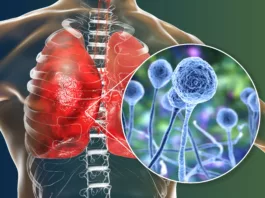What is Cryptosporidiosis?
Cryptosporidiosis, commonly referred to as “crypto,” is a parasitic infection caused by the Cryptosporidium parasite. It spreads through the fecal-oral route and causes gastrointestinal problems like diarrhea, nausea, vomiting, etc. The Cryptosporidium parasite is excreted in the stool of infected individuals and animals. You acquire the disease mainly through the consumption of water or food contaminated with fecal matter containing the parasite.
The global prevalence of cryptosporidiosis is 7.6%, and the disease is prevalent in low-income/developing countries with poor sanitation conditions.1Dong, S., Yang, Y., Wang, Y., Yang, D., Yang, Y., Shi, Y., … & Zhou, Y. (2020). Prevalence of Cryptosporidium infection in the global population: a systematic review and meta-analysis. Acta Parasitologica, 65, 882-889. It usually affects pediatric patients and is a primary cause of moderate-to-severe diarrhea in children (affecting more than 7 million kids in Asia and Sub-Saharan Africa). Moreover, it is responsible for more than 200,000 deaths per annum in children (in these regions only).2Korpe, P. S., Valencia, C., Haque, R., Mahfuz, M., McGrath, M., Houpt, E., … & Duggal, P. (2018). Epidemiology and risk factors for cryptosporidiosis in children from 8 low-income sites: results from the MAL-ED study. Clinical Infectious Diseases, 67(11), 1660-1669. The disease can be life-threatening in patients with weakened immune systems.
Cryptosporidiosis Symptoms
Diarrhea:
Watery diarrhea is the most evident symptom of crypto. It is recognized as a major cause of diarrhea in children and adults. Many patients report explosive watery diarrhea as a symptom of the condition.3Xiao, L., & Griffiths, J. K. (2020). Cryptosporidiosis. In Hunter’s Tropical Medicine and Emerging Infectious Diseases (pp. 712-718). Elsevier. The excessive loss of water can consequently lead to dehydration. Cryptosporidiosis can develop as an opportunistic infection in transplant patients (kidney/pancreas). Reports show that such patients are at a great risk of developing diarrhea and dehydration.4Deltombe, C., Lefebvre, M., Morio, F., Boutoille, D., Imbert, B. M., Le Pape, P., … & Hourmant, M. (2020). Cryptosporidiosis and microsporidiosis as causes of diarrhea in kidney and/or pancreas transplant recipients. Médecine et Maladies Infectieuses, 50(5), 407-413.
Crypto is known to cause life-threatening diarrhea in infants (and children below 5) and immunocompromised adults.5Azami, M., Amini Rarani, S., & Kiani, F. (2023). Treatment of Urticaria caused by severe cryptosporidiosis in a 17-month-old child–a case report. BMC Infectious Diseases, 23(1), 461. Therefore, pediatric patients and individuals with weak immunity should get immediate medical attention.
Low Grade Fever:
Protozoal infections usually cause fever. This intestinal infection also causes low-grade fever in its victims. Gastrointestinal symptoms accompany the raised body temperature.
Stomach Pain:
In addition to diarrhea, patients also report abdominal pain and cramping with diarrhea. There are reports of young patients suffering from chronic diarrhea and acute abdominal pain due to underlying cryptosporidium infection.6Dillon, B., Keefer, L., & Malone, L. (2022). Double Trouble: Ten-Year-Old Girl With Chronic Diarrhea and Acute Abdominal Pain. Clinical Pediatrics, 61(9), 654-658. Cramps may accompany stomach pain and diarrhea.

Nausea & Vomiting:
Gastrointestinal symptoms are highly common in parasitic infections such as crypto. According to a study, 24% of patients reported nausea as a long-term sequelae of the disorder.7Carter, B. L., Chalmers, R. M., & Davies, A. P. (2020). Health sequelae of human cryptosporidiosis in industrialized countries: a systematic review. Parasites & Vectors, 13, 1-14. Thus, this protozoal infection induces feelings of nausea and may cause vomiting in patients.
Loss Of Appetite:
In addition to vomiting, cramps, and diarrhea, patients may also experience appetite loss. This loss, paired with severe diarrhea, can lead to weight loss.8Javed, K., & Alkheraije, K. A. (2023). Cryptosporidiosis: A Foodborne Zoonotic Disease of Farm Animals and Humans. Pakistan Veterinary Journal, 43(2).
Other symptoms of cryptosporidiosis are fatigue and headache.
Cryptosporidiosis Causes
The pathogen responsible for crypto is a protozoan (one-celled organism that survives on animal/human hosts) Cryptosporidium. Two forms of protozoa, Cryptosporidium hominis, and Cryptosporidium parvum, are notorious for causing human infection. Different subtypes of the parvum species have been identified in Chinese cryptosporidium patients.9Guo, Y., Ryan, U., Feng, Y., & Xiao, L. (2022). The emergence of zoonotic Cryptosporidium parvum in China. Trends in Parasitology, 38(4), 335-343.
The parasite enters your body via the mouth (through contaminated water/food) and makes its way to the digestive tract. Inside the digestive system, it reproduces and disrupts normal function, leading to symptoms.
Risk Groups:
The following people are at a greater risk of crypto:
- Infants (children under 5)
- Organ transplant patients and patients on immunosuppressant drugs
- Individuals with weakened immunity (HIV, cancer patients, etc.)
Is Cryptosporidiosis Contagious?
Yes, but cryptosporidiosis spreads between humans indirectly. You can not acquire the infection by just direct contact with an infected individual. Poor hygiene is a key factor required for transmission. So, person-to-person transmission is possible if the infected individual doesn’t wash hands after using the toilet. The bacteria from the unclean hands can transfer to food items, food, and even your skin (direct contact).
Moreover, if a person with diarrhea enters a swimming pool, he may contaminate the pool and be a source of bacterial transmission. You can get the disease by swimming in that water (by water ingestion and skin contact).
How Does Cryptosporidium Spread?
Cryptosporidium is a protozoan parasite that is shed in the feces of infected humans and animals. The parasite spreads through the fecal-oral route, and the following are common ways it can be transmitted:

Swimming in the Pool with Infected Individuals:
Cryptosporidium is highly resistant to standard chlorine levels in swimming pools, making it a significant cause of waterborne outbreaks. People can become infected if they swallow pool water contaminated with the parasite. This has been a growing concern in public health, with documented outbreaks occurring in swimming pools.10Bagnall, H., Chalmers, R. M., Henderson, M., Sorrell, S., Robinson, G., Elwin, K., & Dolan, G. (2021). Swimming pool-related outbreak of a rare gp60 subtype of cryptosporidium hominis, England, October 2016. Water, 13(22), 3152.
Consuming Food/Water contaminated with Feces:
Research shows that cryptosporidium is a major cause of foodborne and waterborne outbreaks.11Zahedi, A., & Ryan, U. (2020). Cryptosporidium–an update with an emphasis on foodborne and waterborne transmission. Research in Veterinary Science, 132, 500-512. Thus, the following foods can land you in trouble:
- Unpasteurized milk and juices (apple cider, etc.)
- Unwashed vegetables and fruits
Touching Contaminated Surfaces & Infected Animals:
Touching surfaces contaminated with Cryptosporidium oocysts (such as diaper-changing tables or household items) and failing to wash hands properly can lead to accidental ingestion of the parasite. Similarly, handling infected animals or their feces can be a source of infection, especially for pet owners or animal keepers.
Having Sex with an Infected Person:
The exchange of body fluids (saliva, semen, blood, etc.) can cause transmission of crypto from one person to another. Unprotected anal sex can contribute to disease spread. Cryptosporidiosis transmission has been reported in men-to-men sex encounters.12McNeil, C. J., Kirkcaldy, R. D., & Workowski, K. (2022). Enteric infections in men who have sex with men. Clinical Infectious Diseases, 74(Supplement_2), S169-S178.
Cryptosporidiosis Diagnosis
History & Physical Examination:
Your healthcare provider will take a complete history of the onset and the severity of the diarrhea and other symptoms. A thorough physical examination follows history taking.
Stool Sample:
A crypto patient can continue to release pathogens in his stool for several days (even after the resolution of symptoms). However, detecting cryptosporidium in the feces is tricky because the level of the parasite in the stool keeps undulating. Thus, your doctor may order multiple stool tests on different days to confirm the diagnosis. The stool sample is sent to the lab to be seen under a microscope to check the presence of parasites.
Polymerase Chain Reaction (PCR):
Modern laboratories use PCR to check parasitic DNA in the stool specimen.
Cryptosporidiosis Treatment
Patients with a healthy immune system do not need treatment as the disease resolves on its own. However, pediatric patients and weak immunity patients usually need proper treatment.
Anti-Parasitic Medications:
Different anti-protozoal medicines have shown good effectiveness in treating cryptosporidiosis. The most frequently prescribed anti-protozoal drug for crypto is Nitazoxanide. However, studies suggest that nitazoxanide works efficaciously only in severe patients with healthy immune systems.13Diptyanusa, A., & Sari, I. P. (2021). Treatment of human intestinal cryptosporidiosis: A review of published clinical trials. International Journal for Parasitology: Drugs and Drug Resistance, 17, 128-138. Until now, there are no effective drugs for potentially life-threatening cryptosporidiosis in young children and immunodeficient patients.14Khan, S. M., & Witola, W. H. (2023). Past, current, and potential treatments for cryptosporidiosis in humans and farm animals: A comprehensive review. Frontiers in cellular and infection microbiology, 13, 1115522. Thus, experts declare it a “truly neglected tropical disease (NTD).”15Gilbert, I. H., Vinayak, S., Striepen, B., Manjunatha, U. H., Khalil, I. A., & Van Voorhis, W. C. (2023). Safe and effective treatments are needed for cryptosporidiosis, a truly neglected tropical disease. BMJ Global Health, 8(8), e012540. Different drugs are being tested, but no major breakthroughs have been made due to significant side effects.
So, it is better to prevent the occurrence of the disease or at least halt the progression to severe forms.
Symptomatic Management:
As the disease induces severe diarrhea, hydration is very important. Patients must drink plenty of fluids. Moderate-to-severe cases require IV hydration to make up for the water loss.
Doctors also prescribe anti-diarrheal medicines (like loperamide or diphenoxylate-atropine, etc.) to control diarrhea. For the best management of the disease, drink ample water, take your medications, keep an eye on your symptoms, and report to your doctors if diarrhea gets worse (more than 10 watery stools in a day).
How Can I Prevent Cryptosporidiosis?
You can minimize the risk of infection by adopting good hygiene habits. The following steps can help you reduce the chances of getting cryptosporidiosis:
- Frequently wash hands, especially after using the loo and before eating food. Make sure you avoid touching your face after petting animals until you have washed your hands.
- Avoid untreated water, unpasteurized milk, and juices.
- Properly peel off fruits and cook vegetables to kill any germs.
- When swimming in lakes/pools/ponds, try to avoid getting water in your mouth.
- Do not go swimming if you have diarrhea (at least for 2 weeks after the symptoms resolve) to keep others safe.
- Teach these washing practices to your children because they are at a greater risk of infection.
- Use protection (condom, etc.) while having sex to prevent the exchange of fluids.
Final Word
Cryptosporidiosis is a neglected tropical disease caused by a protozoal parasite, Cryptosporidium. It causes severe watery diarrhea, fever, abdominal pain/cramps, and GIT symptoms like nausea, vomiting, loss of appetite, etc. People get infected by the parasite by drinking water contaminated with feces, swimming in a pool (with a crypto patient), or touching contaminated objects and infected animals. The fecal-oral transmission route is an indirect way of spreading disease, which can be avoided by adopting good hand-washing habits.
For patients with healthy immune systems, the disease goes away without treatment. However, in infants, children, and individuals with weak immune systems (HIV, cancer, transplant patients, etc.), it can transform into a potentially life-threatening form. Unfortunately, there are no effective drugs to deal with the severe form. Anti-protozoal medicine, i.e., nitazoxanide, is the only FDA-approved drug that works well for moderate cases. You can manage the condition by drinking copious amounts of fluids and taking anti-diarrheal medicines (like loperamide, etc.). Due to a lack of proper treatment guidelines, it is best to prevent the occurrence and progression of the disease. You can keep the disease at bay by washing your hands frequently and using properly cleaned/cooked food and water.
Refrences
- 1Dong, S., Yang, Y., Wang, Y., Yang, D., Yang, Y., Shi, Y., … & Zhou, Y. (2020). Prevalence of Cryptosporidium infection in the global population: a systematic review and meta-analysis. Acta Parasitologica, 65, 882-889.
- 2Korpe, P. S., Valencia, C., Haque, R., Mahfuz, M., McGrath, M., Houpt, E., … & Duggal, P. (2018). Epidemiology and risk factors for cryptosporidiosis in children from 8 low-income sites: results from the MAL-ED study. Clinical Infectious Diseases, 67(11), 1660-1669.
- 3Xiao, L., & Griffiths, J. K. (2020). Cryptosporidiosis. In Hunter’s Tropical Medicine and Emerging Infectious Diseases (pp. 712-718). Elsevier.
- 4Deltombe, C., Lefebvre, M., Morio, F., Boutoille, D., Imbert, B. M., Le Pape, P., … & Hourmant, M. (2020). Cryptosporidiosis and microsporidiosis as causes of diarrhea in kidney and/or pancreas transplant recipients. Médecine et Maladies Infectieuses, 50(5), 407-413.
- 5Azami, M., Amini Rarani, S., & Kiani, F. (2023). Treatment of Urticaria caused by severe cryptosporidiosis in a 17-month-old child–a case report. BMC Infectious Diseases, 23(1), 461.
- 6Dillon, B., Keefer, L., & Malone, L. (2022). Double Trouble: Ten-Year-Old Girl With Chronic Diarrhea and Acute Abdominal Pain. Clinical Pediatrics, 61(9), 654-658.
- 7Carter, B. L., Chalmers, R. M., & Davies, A. P. (2020). Health sequelae of human cryptosporidiosis in industrialized countries: a systematic review. Parasites & Vectors, 13, 1-14.
- 8Javed, K., & Alkheraije, K. A. (2023). Cryptosporidiosis: A Foodborne Zoonotic Disease of Farm Animals and Humans. Pakistan Veterinary Journal, 43(2).
- 9Guo, Y., Ryan, U., Feng, Y., & Xiao, L. (2022). The emergence of zoonotic Cryptosporidium parvum in China. Trends in Parasitology, 38(4), 335-343.
- 10Bagnall, H., Chalmers, R. M., Henderson, M., Sorrell, S., Robinson, G., Elwin, K., & Dolan, G. (2021). Swimming pool-related outbreak of a rare gp60 subtype of cryptosporidium hominis, England, October 2016. Water, 13(22), 3152.
- 11Zahedi, A., & Ryan, U. (2020). Cryptosporidium–an update with an emphasis on foodborne and waterborne transmission. Research in Veterinary Science, 132, 500-512.
- 12McNeil, C. J., Kirkcaldy, R. D., & Workowski, K. (2022). Enteric infections in men who have sex with men. Clinical Infectious Diseases, 74(Supplement_2), S169-S178.
- 13Diptyanusa, A., & Sari, I. P. (2021). Treatment of human intestinal cryptosporidiosis: A review of published clinical trials. International Journal for Parasitology: Drugs and Drug Resistance, 17, 128-138.
- 14Khan, S. M., & Witola, W. H. (2023). Past, current, and potential treatments for cryptosporidiosis in humans and farm animals: A comprehensive review. Frontiers in cellular and infection microbiology, 13, 1115522.
- 15Gilbert, I. H., Vinayak, S., Striepen, B., Manjunatha, U. H., Khalil, I. A., & Van Voorhis, W. C. (2023). Safe and effective treatments are needed for cryptosporidiosis, a truly neglected tropical disease. BMJ Global Health, 8(8), e012540.





